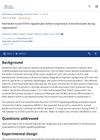 11 citations,
November 2018 in “Journal of the American Academy of Dermatology”
11 citations,
November 2018 in “Journal of the American Academy of Dermatology” Tofacitinib therapy can effectively regrow eyebrows and eyelashes in some alopecia areata patients.
 11 citations,
November 2015 in “Experimental Dermatology”
11 citations,
November 2015 in “Experimental Dermatology” The conclusion is that the IL-6/STAT3 activation affects p63 expression in healing wounds, which may help in hair follicle regeneration.
 8 citations,
May 2017 in “Singapore Medical Journal”
8 citations,
May 2017 in “Singapore Medical Journal” A Korean woman with complete hair loss regrew her hair after taking tofacitinib, with no side effects.
8 citations,
January 2017 in “Dermatology online journal” Tofacitinib helped psoriasis but not alopecia universalis, needing more research.
 6 citations,
February 2023 in “Journal of the American Academy of Dermatology”
6 citations,
February 2023 in “Journal of the American Academy of Dermatology” Upadacitinib improved hair regrowth and quality of life in alopecia areata patients with minimal side effects.
 6 citations,
June 2016 in “Experimental Dermatology”
6 citations,
June 2016 in “Experimental Dermatology” Frontal Fibrosing Alopecia is a poorly understood condition that is hard to treat and causes distressing hair loss.
 6 citations,
March 2016 in “Scandinavian journal of immunology”
6 citations,
March 2016 in “Scandinavian journal of immunology” Janus kinase inhibitors show promise in treating alopecia areata but need more safety research.
6 citations,
December 2013 in “Journal of Investigative Dermatology Symposium Proceedings” Alopecia areata involves complex immune and genetic factors, with potential treatment targets identified, but more research is needed.
 5 citations,
January 2022 in “Dermatology Reports”
5 citations,
January 2022 in “Dermatology Reports” Tofacitinib treatment for hair loss may worsen acne.
 5 citations,
January 2021 in “Inflammatory Bowel Diseases”
5 citations,
January 2021 in “Inflammatory Bowel Diseases” Tofacitinib improved ulcerative colitis, skin ulcers, and hair loss in a patient who didn't respond well to other treatments.
 5 citations,
March 2019 in “Dermatologic Clinics”
5 citations,
March 2019 in “Dermatologic Clinics” New treatments for hair loss show promise, but require more research on long-term effects and proper dosing.
 4 citations,
January 2022 in “Dermatologic Therapy”
4 citations,
January 2022 in “Dermatologic Therapy” Tofacitinib was found to be a safe and effective treatment for hair regrowth in patients with alopecia areata.
 3 citations,
September 2021 in “Journal of Investigative Dermatology”
3 citations,
September 2021 in “Journal of Investigative Dermatology” Baricitinib was more effective than a placebo in regrowing hair in adults with alopecia areata after 36 weeks.
3 citations,
October 2020 in “The journal of investigative dermatology. Symposium proceedings/The Journal of investigative dermatology symposium proceedings” Alopecia areata is a hair loss disease caused by complex immune reactions, and new targeted treatments show promise.
 2 citations,
March 2022 in “Journal of Personalized Medicine”
2 citations,
March 2022 in “Journal of Personalized Medicine” Personalized medicine is important for treating skin disorders, with new treatments and connections to hormones and genetics being explored.
2 citations,
February 2023 in “Actas Dermo-Sifiliográficas” Baricitinib effectively improved both atopic dermatitis and alopecia areata symptoms in a patient.
 1 citations,
January 2024 in “Curēus”
1 citations,
January 2024 in “Curēus” Upadacitinib significantly improved a man's severe scalp condition when other treatments failed.
 1 citations,
October 2023 in “Dermatology and therapy”
1 citations,
October 2023 in “Dermatology and therapy” Some treatments for severe hair loss work but often have side effects, with baricitinib showing the most promise.
 1 citations,
March 2023 in “Clinical, Cosmetic and Investigational Dermatology”
1 citations,
March 2023 in “Clinical, Cosmetic and Investigational Dermatology” Current treatments for Alopecia Areata have mixed success, and there's a need for better, more accessible options and support for affected individuals.
 1 citations,
January 2023 in “Cutis”
1 citations,
January 2023 in “Cutis” The paper concludes that the new medication baricitinib needs further testing in a more diverse group of patients with alopecia areata.
 1 citations,
September 2022 in “JAAD international”
1 citations,
September 2022 in “JAAD international” Patients generally feel positive about alopecia areata treatments, but emotions vary by treatment type.
 1 citations,
September 2022 in “Journal of The American Academy of Dermatology”
1 citations,
September 2022 in “Journal of The American Academy of Dermatology” Baricitinib helps grow eyebrows and eyelashes in severe alopecia areata patients.
 1 citations,
August 2022 in “Journal of Dermatology and Dermatologic Surgery”
1 citations,
August 2022 in “Journal of Dermatology and Dermatologic Surgery” A patient developed nerve problems as a side effect of a hair loss treatment called tofacitinib.
 1 citations,
May 2021 in “Annals of the rheumatic diseases”
1 citations,
May 2021 in “Annals of the rheumatic diseases” Tofacitinib is a promising treatment for children with rheumatic diseases.
1 citations,
November 2018 in “immuneACCESS” Expanded CD8+ T cells are linked to Alopecia Areata and may cause relapse after treatment.
 1 citations,
July 2018 in “Elsevier eBooks”
1 citations,
July 2018 in “Elsevier eBooks” Alopecia Areata is an autoimmune hair loss condition, with various treatments showing mixed effectiveness and no guaranteed cure.
 1 citations,
June 2018 in “International Journal of Dermatology”
1 citations,
June 2018 in “International Journal of Dermatology” DNCB is highly effective for treating alopecia areata with minimal long-term side effects.
 1 citations,
April 2018 in “The journal of investigative dermatology/Journal of investigative dermatology”
1 citations,
April 2018 in “The journal of investigative dermatology/Journal of investigative dermatology” Oral tofacitinib significantly improves lichen planopilaris symptoms without adverse effects.
 1 citations,
May 2017 in “Journal of the American Academy of Dermatology”
1 citations,
May 2017 in “Journal of the American Academy of Dermatology” Tofacitinib helped a teenager with severe hair loss grow hair back, but more research is needed.
 October 2024 in “Canadian Journal of Health Technologies”
October 2024 in “Canadian Journal of Health Technologies” Olumiant should be covered for severe alopecia areata if certain conditions are met.

























